UPDATE March 26, 2018: The Gainesville, FL City Commission unanimously passed a "zero waste" policy late last week, according to Gainesville Mayor Lauren Poe.
It includes working on ordinances to ban single-use plastic bags and expanded polystyrene. Other steps will include working to better measure and avoid waste streams.
Dive Brief:
- City Commissioner Adrian Hayes-Santos wants Gainesville, FL to have "the most progressive recycling ordinance in the Southeast," as reported by WUFT. This is part of a broader plan to hit a 75% recycling rate by 2020, 90% by 2030 and "zero waste" by 2040.
- Hayes-Santos has reportedly been discussing these ideas since his 2016 election and will present a formal plan next year. That is expected to include a proposed ban on plastic grocery bags and expanded polystyrene foam containers. Some type of organics collection and composting program is also a priority.
- To achieve these goals, and a number of others, Hayes-Santos is interested in creating an office of sustainability. The city may also partner with the University of Florida, Alachua County Public Schools and the newly formed community group Zero Waste Gainesville.
Dive Insight:
Florida has an overall recycling rate goal of 75% by 2020 — which factors in credits from waste-to-energy and other renewable sources — and the latest annual data showed a 54% rate for 2015. Alachua County, where Gainesville makes up close to half the population, came in above average with a 61% rate. Though it had a slightly higher than average per capita disposal rate. Unlike some other counties, Alachua still sends more material to landfills than waste-to-energy facilities and is less open to potential critiques over inflated rates due to combustion.
Unlike some cities in other parts of the country, Gainesville's Public Works Department is still promoting a message of "when in doubt - don't throw it out" to increase recycling participation. Whereas a growing number of cities are taking the opposite approach to combat contamination caused by "wish-cycling" as China's import restrictions change market options. According to Florida's Department of Environmental Protection, and conversations with other Southeast sources, China's policies have not had notable effects on the state yet due to more regional markets.
Florida may not be the top state on people's minds when it comes to recycling efforts, but this new Gainesville plan isn't the only effort to change that. In recognition of the contamination issue, the state has launched a "Rethink. Reset. Recycle." campaign to improve education. Orlando has also been selected as a pilot city for the U.S. Chamber of Commerce Foundation's "Beyond 34" recycling initiative and Disney World's longtime food waste diversion efforts recently received attention from the Environmental Protection Agency. While Gainesville may run into some of the same challenges with packaging ordinances as some of its fellow Florida cities it seems to have found a positive climate to start the broader "zero waste" conversation.















